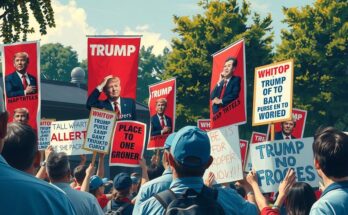Brazilians voted in their local elections on October 5, 2024, focusing heavily on São Paulo’s competitive mayoral race, involving incumbent Ricardo Nunes, Guilherme Boulos of the left, and far-right candidate Pablo Marçal. The elections were marked by violence and controversies, including an altercation in a debate and the dissemination of false information. Over 155 million Brazilians were eligible to vote, with a notable increase in transgender candidates participating, reflecting greater political diversity.
On Sunday, October 5, 2024, Brazilians commenced voting in the initial round of local elections across the nation’s 5,569 municipalities, where residents would elect mayors, deputy mayors, and councilors. The election garnered significant focus in São Paulo, Brazil’s largest city, where three candidates are in close competition: incumbent mayor Ricardo Nunes, left-oriented candidate Guilherme Boulos, and far-right newcomer Pablo Marçal. A second round of voting is slated for October 27, should no candidate secure an absolute majority. The lead-up to the elections has been characterized by heightened tension and instances of violence associated with Marçal. Notably, during a televised debate last month, former TV host José Luiz Datena assaulted Marçal with a metal chair after Marçal referenced allegations of sexual misconduct. In another incident, a confrontation involving Marçal’s aide resulted in significant injury to a rival candidate. Further controversy arose shortly before the elections when Marçal disseminated a doctored medical document alleging drug use by his opponent, Boulos. This claim was quickly falsified by local news outlets, which noted that the document was signed by a deceased physician. Boulos firmly rejected the accusations, leading to a court intervention that temporarily suspended Marçal’s social media account due to suspected electoral violations. In Rio de Janeiro, current mayor Eduardo Paes sought to avert a runoff as polls indicated increasing competition from challenger Alexandre Ramagem, a former head of Brazil’s intelligence agency, under investigation for alleged political misconduct. While Paes maintained a lead in polls, Ramagem’s recent gains have made the outcome of the elections uncertain, especially with the support of former President Jair Bolsonaro. This election cycle marks a historic moment for LGBTQ+ representation, particularly with nearly 1,000 transgender candidates participating across the 26 states of Brazil, a significant increase from previous elections. Polls opened at 8 a.m. Brasilia time and concluded at 5 p.m. (2000 GMT), with anticipation mounting as the nation awaited the results.
The local elections in Brazil hold significant importance as they reflect the political climate and public sentiment in the country. With over 155 million eligible voters, these elections represent a critical juncture for various political factions, especially in light of recent controversies and confrontations among the candidates. The increasing number of transgender candidates also underscores evolving societal attitudes toward inclusivity and representation in Brazilian politics. The attention on São Paulo, given its size and influence, enhances the relevance of this election.
The local elections in Brazil reveal a highly charged political atmosphere with intense rivalry among candidates, particularly in major cities like São Paulo and Rio de Janeiro. Incidents of violence and last-minute controversies highlight the stakes involved as various factions vie for control. The participation of a historic number of transgender candidates marks a progressive shift in Brazilian politics, showcasing a broader acceptance and representation of diverse communities. As the nation proceeds with future rounds of voting, the implications of these elections will resonate throughout the political landscape.
Original Source: apnews.com




